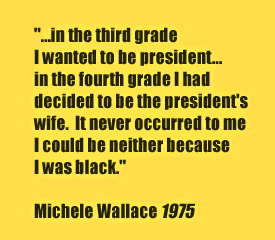
Contemporary African-American Thought: the 1970s
TOPICS >>>
Tensions in the National Black
Political Assembly, 1972-1976
Development and ideological conflicts in the African Liberation
Support Committee (ALSC) --ALD events
Parallels: Liberation struggles in Guine-Bissau, Angola, Mozambique,
Tanzania, and South Africa; influence of Amilcar Cabral, Agostinho Neto,
Eduardo Mondlane, Julius Nyerere, Michael Manley of Jamaica on US Blacks
Richard Hatcher
March, 1972--Gary Convention:
The high point of Black Nationalism
Conflicting interpretations of Black Power Politics:
l969-70--
Widespread suppression, destruction of the BPP;
murders of Mark Clark, Fred Hampton in Chicago
1970--
Baraka creates the Congress of Afrikan People (CAP)
197l--
Congressional Black Caucus established
197l--
Baraka as central theoretician of Black Nationalism, call for
World African Party; Pan-Africanism; calls for a National Black Political
Assembly
The Administration of Richard M. Nixon, 1969-1974:
"The Silent Majority"
Vice President Spiro T. Agnew
Appointment of conservatives to the Supreme Court-- Carswell,
Haynsworth
Lewis F. Powell-- 1971; Wm. Rehnquist of Arizona; Warren Burger,
Minn.
Moynihan's policy of "Benign Neglect" toward blacks,
civil rights movement, affirmative action policies of the 1970s
impact on business/employment opportunities for African-Americans
"special markets"; glass ceiling; "racialized careers"; corporations learn
how to manipulate/gain access to black consumer markets
The Demise of the Second Reconstruction:
Failures of Black middle
class leadership
example: Ernest "Dutch" Morial, mayor of New Orleans
Decline of black social/cultural institutions:
Rise of evangelical groups;
collapse, reconstruction of the NOI around Louis Farrakhan
The restructuring of American politics:
Democratic left, bipartisan
center, mass conservativism; implications of the realignment of American
political culture on the African-American community
PERSONALITIES >>>
Maynard Jackson, Coleman Young , Thomas Bradley --
black mayors of major U.S. cities
Barbara Jordan and
Charles Diggs, Jr.
-- prominent
black Congressional leaders
READINGS >>>
Giddings, When
and Where I Enter, Chapters
XVII and XVIII, pp. 299-335.
Marable, Race,
Reform and Rebellion, Chapter
VI, "Black Rebellion: Zenith and Decline, 1970-1976," pp. 114-148, and
part of Chapter VII, "Reaction: The Demise of the Second Reconstruction,
1976-1982," pp. 149-163.
Marable and Mullings, eds.,
Let Nobody Turn Us Around,
Section Five, "Introduction," pp. 511-518 and Numbers 1-3, pp. 519-535.
MULTIMEDIA >>>
Music:
Curtis Mayfield - "Freddie's
Dead" (1972)
Curtis Mayfield - "Little
Child Runnin' Wild" (1972)
Stevie Wonder - "Living
for the City" (1973)
The Staple Singers - "Respect
Yourself" (1972)
The Staple Singers - "I'll
Take You There" (1972)
Bob Marley - "Get
Up Stand Up" (1973)
Bob Marley - "Redemption
Song" (1980)
Films: Clips
from Black exploitation films Shaft, Superfly. News clips of Soweto children's
uprising in South Africa, 1976-77. News clips on the Gary Black Political
Convention of March 1972.
|










